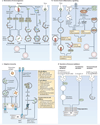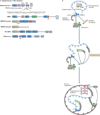Autophagy in infection, inflammation and immunity
- PMID: 24064518
- PMCID: PMC5340150
- DOI: 10.1038/nri3532
Autophagy in infection, inflammation and immunity
Abstract
Autophagy is a fundamental eukaryotic pathway that has multiple effects on immunity. Autophagy is induced by pattern recognition receptors and, through autophagic adaptors, it provides a mechanism for the elimination of intracellular microorganisms. Autophagy controls inflammation through regulatory interactions with innate immune signalling pathways, by removing endogenous inflammasome agonists and through effects on the secretion of immune mediators. Moreover, autophagy contributes to antigen presentation and to T cell homeostasis, and it affects T cell repertoires and polarization. Thus, as we discuss in this Review, autophagy has multitiered immunological functions that influence infection, inflammation and immunity.
Figures



References
-
- Mizushima N, Yoshimori T, Ohsumi Y. The role of atg proteins in autophagosome formation. Annual review of cell and developmental biology. 2011;27:107–132. - PubMed
-
- Mizushima N, Komatsu M. Autophagy: renovation of cells and tissues. Cell. 2011;147:728–741. - PubMed
-
- Codogno P, Mehrpour M, Proikas-Cezanne T. Canonical and non-canonical autophagy: variations on a common theme of self-eating? Nat Rev Mol Cell Biol. 2012;13:7–12. - PubMed
Publication types
MeSH terms
Substances
Grants and funding
LinkOut - more resources
Full Text Sources
Other Literature Sources
Medical

